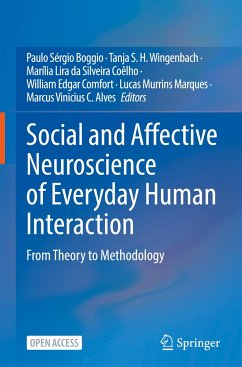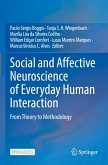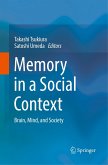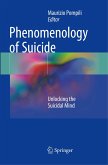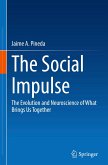Social and Affective Neuroscience of Everyday Human Interaction
From Theory to Methodology
Herausgegeben:Boggio, Paulo Sérgio; Wingenbach, Tanja S. H.; da Silveira Coêlho, Marília Lira; Comfort, William Edgar; Murrins Marques, Lucas; Alves, Marcus Vinicius C.
Social and Affective Neuroscience of Everyday Human Interaction
From Theory to Methodology
Herausgegeben:Boggio, Paulo Sérgio; Wingenbach, Tanja S. H.; da Silveira Coêlho, Marília Lira; Comfort, William Edgar; Murrins Marques, Lucas; Alves, Marcus Vinicius C.
- Gebundenes Buch
- Merkliste
- Auf die Merkliste
- Bewerten Bewerten
- Teilen
- Produkt teilen
- Produkterinnerung
- Produkterinnerung
This Open Access book presents the current state of the art knowledge on social and affective neuroscience based on empirical findings. This volume is divided into several sections first guiding the reader through important theoretical topics within affective neuroscience, social neuroscience and moral emotions, and clinical neuroscience. Each chapter addresses everyday social interactions and various aspects of social interactions from a different angle taking the reader on a diverse journey. The last section of the book is of methodological nature. Basic information is presented for the…mehr
Andere Kunden interessierten sich auch für
![Social and Affective Neuroscience of Everyday Human Interaction Social and Affective Neuroscience of Everyday Human Interaction]() Social and Affective Neuroscience of Everyday Human Interaction30,99 €
Social and Affective Neuroscience of Everyday Human Interaction30,99 €![Memory in a Social Context Memory in a Social Context]() Memory in a Social Context112,99 €
Memory in a Social Context112,99 €![Emotion in Group Decision and Negotiation Emotion in Group Decision and Negotiation]() Emotion in Group Decision and Negotiation38,99 €
Emotion in Group Decision and Negotiation38,99 €![The Human Sciences after the Decade of the Brain The Human Sciences after the Decade of the Brain]() The Human Sciences after the Decade of the Brain54,99 €
The Human Sciences after the Decade of the Brain54,99 €![Phenomenology of Suicide Phenomenology of Suicide]() Phenomenology of Suicide67,99 €
Phenomenology of Suicide67,99 €![Environmental Neuroscience Environmental Neuroscience]() Environmental Neuroscience170,99 €
Environmental Neuroscience170,99 €![The Social Impulse The Social Impulse]() Pineda, Ph.D., Jaime A.The Social Impulse119,99 €
Pineda, Ph.D., Jaime A.The Social Impulse119,99 €-
-
-
This Open Access book presents the current state of the art knowledge on social and affective neuroscience based on empirical findings. This volume is divided into several sections first guiding the reader through important theoretical topics within affective neuroscience, social neuroscience and moral emotions, and clinical neuroscience. Each chapter addresses everyday social interactions and various aspects of social interactions from a different angle taking the reader on a diverse journey. The last section of the book is of methodological nature. Basic information is presented for the reader to learn about common methodologies used in neuroscience alongside advanced input to deepen the understanding and usability of these methods in social and affective neuroscience for more experienced readers.
Produktdetails
- Produktdetails
- Verlag: Schweizerischer Nationalfonds zur Förderung der wissenschaftlichen Forschung / Springer / Springer I
- Artikelnr. des Verlages: 978-3-031-08650-2
- 1st ed. 2023
- Seitenzahl: 336
- Erscheinungstermin: 30. November 2022
- Englisch
- Abmessung: 241mm x 160mm x 24mm
- Gewicht: 670g
- ISBN-13: 9783031086502
- ISBN-10: 3031086503
- Artikelnr.: 64000488
- Herstellerkennzeichnung Die Herstellerinformationen sind derzeit nicht verfügbar.
- Verlag: Schweizerischer Nationalfonds zur Förderung der wissenschaftlichen Forschung / Springer / Springer I
- Artikelnr. des Verlages: 978-3-031-08650-2
- 1st ed. 2023
- Seitenzahl: 336
- Erscheinungstermin: 30. November 2022
- Englisch
- Abmessung: 241mm x 160mm x 24mm
- Gewicht: 670g
- ISBN-13: 9783031086502
- ISBN-10: 3031086503
- Artikelnr.: 64000488
- Herstellerkennzeichnung Die Herstellerinformationen sind derzeit nicht verfügbar.
Paulo Sergio Boggio holds a Bachelor's degree in Psychology, MSc and PhD from the University of São Paulo. He leads the Social and Cognitive Neuroscience Laboratory at the Center for Health and Biological Sciences, Mackenzie Presbyterian University. He is a Professor in Developmental Disorders and Psychology at Mackenzie Presbyterian University. He is a CNPq researcher Fellow and a Fellow of the Association for Psychological Science. In 2011, he was elected an Affiliate Member of the Brazilian Academy of Sciences. He has wide experience in the field of Psychology, with an emphasis on Social and Affective Neuroscience. He also has experience with the use of non-invasive techniques of brain stimulation, high density EEG, eye-tracking, and other techniques. Tanja S. H. Wingenbach holds a B.Sc. in Psychology (University of Luxembourg), a M.Sc. in Clinical Psychology (University of Basel), and a PhD in Psychology (University of Bath). From 2017-2019, she held apost-doctoral fellowship at the Social and Cognitive Neuroscience Laboratory, Mackenzie Presbyterian University in Sao Paulo. She was a post-doctoral senior research fellow at the University of Zurich / University Hospital Zurich from 2019-2022, after which she joined the University of Greenwich as a Lecturer in Psychology. Her research falls within emotion sciences and encompasses typical as well as atypical populations. Marília Lira da Silveira Coêlho graduated as a physiotherapist from the University Center of Bahia - FIB and holds a MSc from the Federal University of Bahia and a PhD from Mackenzie Presbyterian University. She is currently a researcher at the Social and Cognitive Neuroscience Lab and professor at the physiotherapy course at Mackenzie University. She studies multisensory integration, visuospatial perception, perceptual illusion, body image, transcranial direct current stimulation and Functional Near Infrared Spectroscopy. William Edgar Comfort received his B.S. in Psychology from Bangor University, MSc in Neuropsychology from the University of Bristol and his PhD in Neuroscience and Cognition from UFABC. He was previously an Associate Professor of Educational Psychology at Osasco University and is currently a Guest Lecturer on the specialization course in Applied Neuroscience and Psychology and a FAPESP post-doctoral fellow in the Social and Cognitive Neuroscience Lab, at Mackenzie Presbyterian University. Lucas Murrins Marques obtained his Bachelor in Psychology from Mackenzie Presbyterian University in 2014, holds a Master's degree in Basic Psychology from Minho University (2013) a Master's in Developmental Disorders from Mackenzie Presbyterian University (2016) and a PhD in Developmental Disorders from Mackenzie Presbyterian University (2020). He is currently a post-doctoral research fellow at IMREA from the Faculty of Medicine of University of São Paulo. His main research interests are in brain stimulation, psychophysiology, machine learning, neurophysiology, neuropsychology, rehabilitation, emotion regulation and wellbeing. Marcus Vinicius Alves has a PhD from Universidade Federal de São Paulo, and experience as a Visiting Researcher at Memorial University of Newfoundland (St. John's, Canada) and as a Research and Development Specialist at Université du Luxembourg (Esch-sur-Alzette, Luxembourg). Currently, Marcus Vinicius Alves is a professor at the Faculty of Health Sciences, Universidade Federal do Rio Grande do Norte, Santa Cruz, Brazil. Alves' research interests include learning, mental effort (attention control and cognitive load), incidental and motivated forgetting, and social cognition, mainly utilizing behavioral experiments, fNIRS, eye tracking, and pupillometry.
Molecular imaging of the human emotion circuit.- The neurocognitive mechanisms of unconscious emotional responses.- Social and Affective Neuroscience of Embodiment.- The neuroscience of beauty.- Mirror Neurons ... in action: ERPs and neuroimaging evidence.- Sex differences in social cognition.- Development of morality and emotional processing.- Trust in Social Interaction: From Dyads to Civilizations.- The time has come to be mindwanderful: Mind wandering and the intuitive psychology mode.- Social Cognition development and socio affective dysfunction in childhood and adolescence.- Clinical neuroscience meets second-person neuropsychiatry.- EEG and ERPs in the study of Language and Social Knowledge.- fMRI and fNIRS methods for social brain studies: hyperscanning possibilities.- Modulating the Social and Affective Brain with transcranial stimulation techniques.- What our eyes can tell us about our social and affective brain?.- Facial EMG - Investigating the interplay of facial muscles and emotions.
Molecular imaging of the human emotion circuit.- The neurocognitive mechanisms of unconscious emotional responses.- Social and Affective Neuroscience of Embodiment.- The neuroscience of beauty.- Mirror Neurons ... in action: ERPs and neuroimaging evidence.- Sex differences in social cognition.- Development of morality and emotional processing.- Trust in Social Interaction: From Dyads to Civilizations.- The time has come to be mindwanderful: Mind wandering and the intuitive psychology mode.- Social Cognition development and socio affective dysfunction in childhood and adolescence.- Clinical neuroscience meets second-person neuropsychiatry.- EEG and ERPs in the study of Language and Social Knowledge.- fMRI and fNIRS methods for social brain studies: hyperscanning possibilities.- Modulating the Social and Affective Brain with transcranial stimulation techniques.- What our eyes can tell us about our social and affective brain?.- Facial EMG - Investigating the interplay of facial muscles and emotions.

